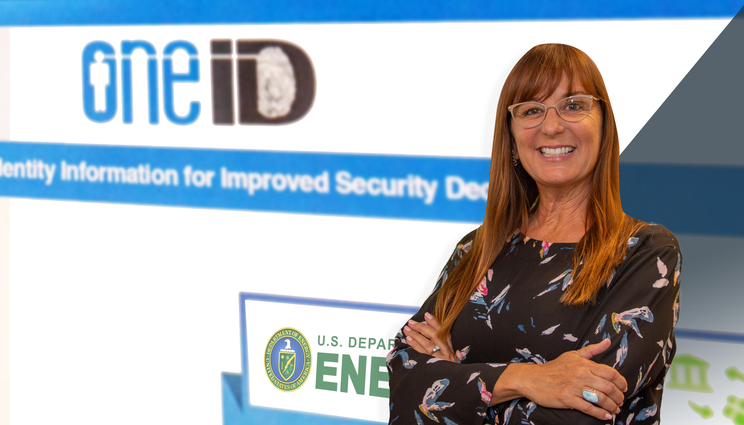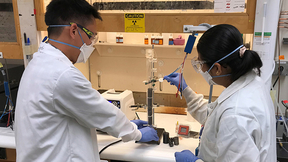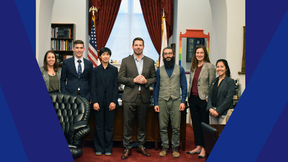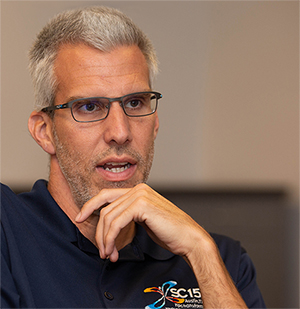FedTech helps accelerate technology transfer
 (Download Image)
(Download Image)
Jacqueline Peila, a computer scientist for Livermore Information Technology, worked for three months on technology commercialization with an Arlington, Virginia-based organization called FedTech. In 2012, Peila wrote a proposal that has grown into the Department of Energy’s Enterprise Identity and Access Management Solution (OneID).
Two Lawrence Livermore National Laboratory (LLNL) computer scientists with promising technologies have taken part in a national organization’s commercialization program that pairs researchers with entrepreneurs.
The two LLNL researchers, Timo Bremer and Jacqueline Peila, each worked for 12 weeks with teams of entrepreneurs, comprised of former CEO’s, executives, graduates and students with master’s degrees in business and others.
Their commercialization work, aimed at forming start-up companies, was done under the auspices of an Arlington, Virginia-based organization called FedTech, which has helped found more than 20 start-up companies in four years, according to FedTech Managing Partner Jake Kramer.
“FedTech is a start-up studio/accelerator that helps the Lab’s Innovation and Partnerships Office (IPO) in its mission to commercialize LLNL technologies by sourcing and vetting exciting new technologies,” said Michael Sharer, IPO’s manager of new ventures and regional engagement.
Timo Bremer, who is a member of the Lab’s Center for Applied Scientific Computing, worked for 12 weeks with a team of entrepreneurs, comprised of former CEO’s, executives, graduates and students with master’s degrees in business (MBA’s) and others.“They then pair these inventors and technologies with entrepreneurs they have recruited and trained, seeking to accelerate the market validation process through their start-up training program.”
A 13-year Lab employee and member of the Lab’s Center for Applied Scientific Computing, Bremer has developed a new technique that allows the extraction of objects from three-dimensional images, such as bombs from airport scans or tumors from medical screens.
Bremer, who also serves on the council of Livermore’s Data Science Institute, worked with a team of seasoned entrepreneurs and MBA graduates who explored various potential market opportunities for his technology.
“I think it’s an excellent program and that more researchers should participate. I found the program to be beneficial and I’d do it again.”
One of the advantages of the FedTech program for national lab, government and university researchers is that it helps them better understand the needs of businesses, he said.
“American industry does much less long-range research and that role is now fulfilled to a larger degree by the national labs, so that’s why it’s now more important for us to work with industry,” Bremer explained.
A computer scientist for Livermore Information Technology, Peila wrote a proposal in 2012 that has grown into the Department of Energy’s Enterprise Identity and Access Management Solution (OneID).
“OneID provides a central repository of identifying information about individual people throughout the DOE complex to be used in making access decisions,” said Peila, who is the program manager for OneID and a 20-year LLNL employee.
OneID allows all 80 of DOE’s disparate sites, labs and plants to securely manage their users’ identities across the various resources. The system aggregates identity data from all of the DOE sites, is the official “agency data steward” for USAccess and has established interfaces for managing an individual’s encryption certificates and active clearance information.
Through her work with investors and business professionals, Peila produced a high-level set of marketing slides for potential commercial partners, which she called an “excellent experience.”
“My work with the entrepreneurs and business people gave me insight into the types of questions that investors would ask us, such as what distinguishes our technology and what makes it unique,” Peila said.
Among the potential uses in Peila’s view for the OneID technology are major companies with operations in different cities, major government agencies, such as the Departments of Homeland Security and Defense, and universities with campuses in different locations.
As information technology services move outside traditional network boundaries and into the cloud (Amazon, Azure), identity has become the new security boundary. It becomes critical to have an accurate corporate/agency view of all individuals, Peila said.
IPO’s Sharer considers the Lab’s work with FedTech to be an important part of its overall commercialization strategy, noting that “many of the technologies developed at the Lab will only make it to market through the formation of a new venture, so FedTech, along with other accelerators and incubators, helps form a critical piece of our new venture formation strategy.”
Contact
 Stephen Wampler
Stephen Wampler
[email protected]
(925) 423-3107
Related Links
FedTechLLNL Innovation and Partnerships Office (IPO)
Tags
Economic ImpactIndustry Collaborations
Technology Transfer
Featured Articles








